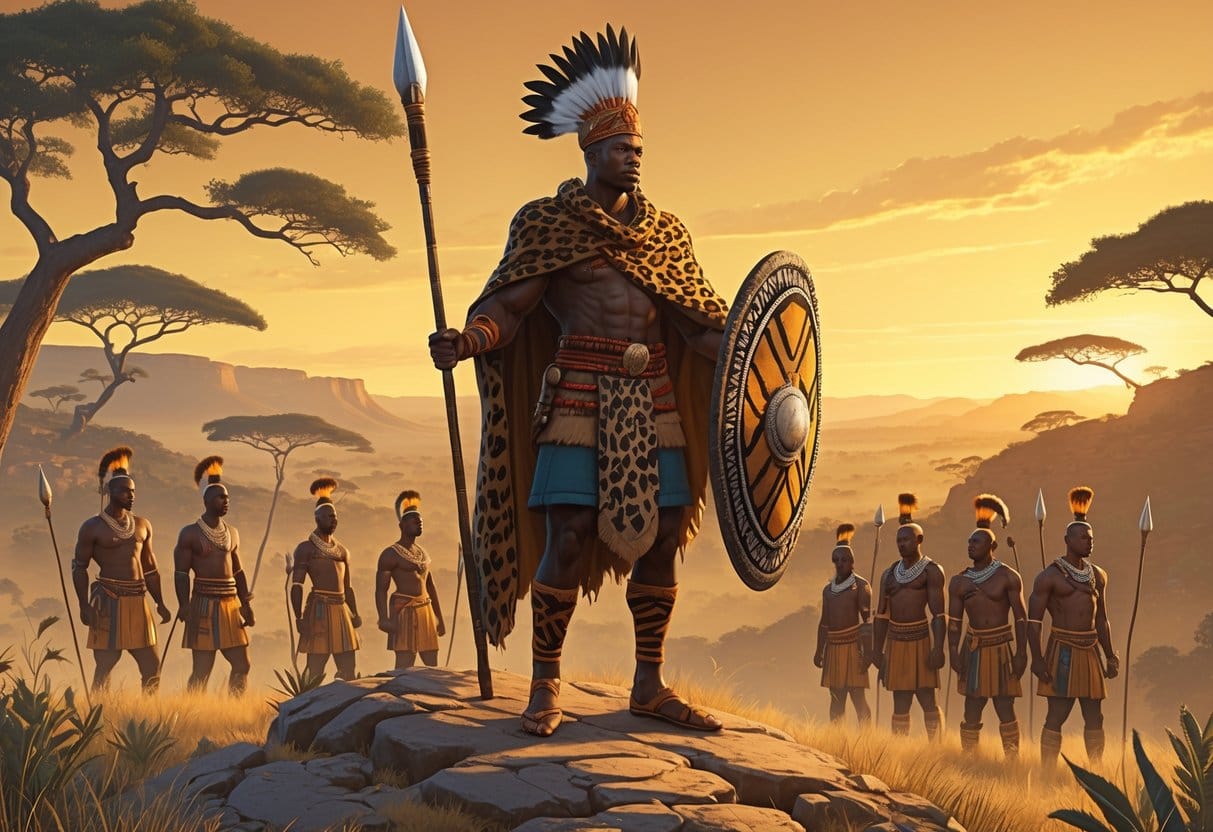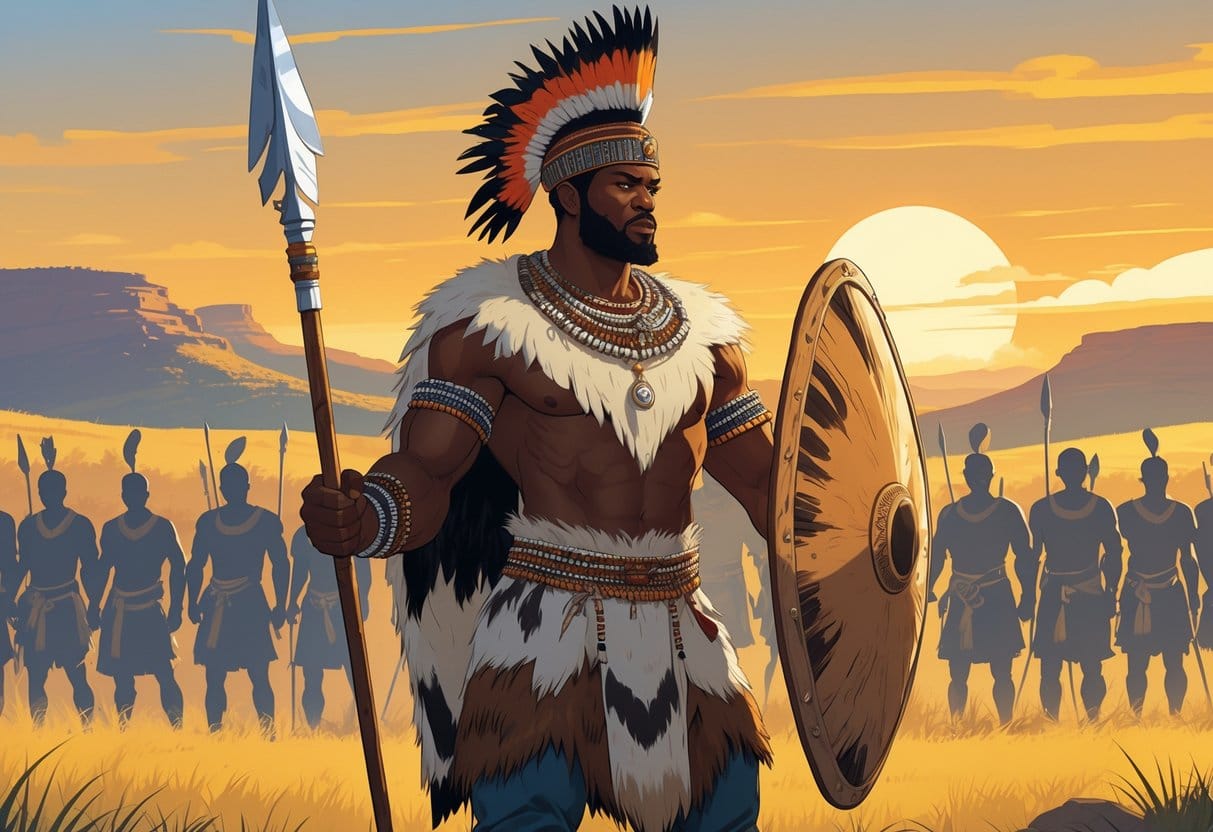Shaka Zulu changed the course of Southern African history. He built the Zulu Kingdom with a mix of bold military moves and powerful leadership.

His tactics were unlike anything seen at the time. They shaped how wars were fought and how the Zulu nation grew stronger.
Shaka’s influence wasn’t just about battles. His leadership style affected the culture and politics of the region for years.
Key Takeaways
- Shaka united different groups to form a strong kingdom.
- His military ideas changed how wars were fought.
- His leadership left a lasting mark on culture and history.
Shaka Zulu and the Rise of the Zulu Kingdom

Shaka rose from a disputed heir to a powerful leader. He built the Zulu Kingdom in Southern Africa.
His military skill and political strategy expanded the kingdom. This shaped relations with nearby groups.
Early Life and Heirship
Shaka was born around 1787, the son of Zulu chief Senzangakhona. His birth was controversial, and his early years were tough.
He spent time under Mthethwa chief Dingiswayo. Dingiswayo became a mentor and helped Shaka develop military skills.
After Dingiswayo’s death, Shaka became the Zulu heir in 1816. His rise was tied to both innovation and political struggles.
Shaka was determined to unite the scattered clans. He wanted them all under his rule.
Founding and Expansion of the Zulu Kingdom
When Shaka became king, the Zulu were just a small coastal clan. He quickly transformed them into a disciplined army.
He introduced new tactics and weapons, like the short stabbing spear, the iklwa. That was a game-changer.
Under Shaka, the Zulu expanded by conquering and absorbing neighbors. This made Zululand a powerful kingdom.
His methods mixed military strength with political strategy.
Here are some of Shaka’s key innovations:
| Innovation | Purpose |
|---|---|
| Short stabbing spear | More effective in close combat |
| Regimental structure | Organized troops by age and skill |
| Cowhide shields | Better defense during battle |
Relationship with Neighboring Peoples
Shaka’s expansion brought him into contact—and conflict—with groups like the Xhosa, Swazi, and others. His rise caused migrations and shifts in power.
He sometimes made alliances, but more often fought to expand. These movements changed the region’s political landscape.
Colonial history later influenced these dynamics, but in the early 1800s, Shaka’s actions shaped the local environment. His leadership inspired both fear and respect among his neighbors.
Leadership, Military Innovations, and State-Building
Shaka Zulu didn’t just change warfare—he reshaped politics, too. His leadership changed how armies fought, how people were governed, and how communities stayed loyal.
His methods affected many parts of Zulu society.
Military Tactics and Strategy
Shaka came up with new ways to fight. He formed impis, or regiments, made up of highly trained warriors.
They used the assegai, a short stabbing spear. It worked better in close combat than the old long spears.
He also developed the “horns of the buffalo” formation. The chest attacked head-on, the horns flanked the enemy, and the loins stayed in reserve.
This tactic trapped opponents. It worked like a tight phalanx.
Shaka’s soldiers carried large cowhide shields. These gave them better protection and fit his aggressive style.
His tactics made the Zulu army fast, disciplined, and deadly—even against enemies with firearms.
Social and Political Reforms
Shaka changed society to support his army. He organized age groups into regiments and made all young men join impis.
This system trained soldiers and built loyalty. Circumcision and initiation rites marked the move from boyhood to warrior.
Shaka encouraged polygynous families led by a great wife. This built alliances and produced many heirs.
He demanded loyalty from chiefs. Those who didn’t support him lost power.
Shaka’s rule was strict, but it brought order during chaos.
State Consolidation and Chieftaincies
Shaka worked to unite many small chiefdoms under Zulu control. He replaced weaker leaders with loyal chiefs.
This helped him build a larger, more organized state. He set up kraals—villages or cattle enclosures—as centers for collecting taxes, food, and warriors.
These kraals tied people to the state. It made controlling land and resources easier.
This consolidation helped start the mfecane, a period of war and migrations across southern Africa.
Innovation and Cultural Influence
Shaka didn’t only upgrade weapons—he changed Zulu culture. His short assegai allowed for faster, closer fighting.
The warrior lifestyle became central to Zulu identity. His military ideas influenced neighbors and shaped politics for decades.
His focus on discipline spread through initiation and training. These changes made his leadership style a model for state-building in the region.
Legacy, Cultural Heritage, and Historical Impact
King Shaka Zulu shaped the politics and cultures of Southern Africa. His actions changed local power balances and influenced how groups interacted with settlers and colonial forces.
His military and social reforms still echo in some traditions.
Influence on Indigenous and Regional Politics
Shaka united the Southern Nguni people into the Zulu Kingdom. His military innovations helped him defeat rivals like the Ndwandwe and expand control across KwaZulu-Natal.
This rise affected neighboring groups, like the Ndebele under Mzilikazi, who fled north to form a new kingdom near Bulawayo. The Zulu expansion also shifted power with the Shona in Zimbabwe.
The impact included breaking old alliances and forcing groups to pick sides. You can still see traces of this in the shifting borders and conflicts of the early 1800s.
Relations with Colonial and European Powers
During Shaka’s reign, European settlers mostly stayed around the Cape Colony. The Afrikaner and British presence grew, pushing into Zulu lands.
Later clashes like the Battle of Blood River and the Anglo-Zulu War showed the struggle between Zulu independence and European colonization. These conflicts were fueled by resources like gold, silver, ivory, and cattle.
European powers often underestimated the Zulu army Shaka built. That mistake changed the way colonial negotiations and wars played out—and shaped how indigenous people dealt with settlers.
Enduring Cultural and Artistic Expressions
Shaka’s cultural legacy still echoes through oral traditions, music, and art among the Zulu and plenty of other groups. Zulu beadwork and storytelling, for instance, often celebrate his leadership and legendary battles.
Music and dance from Shaka’s era honor the rains, cattle wealth, and the social order he worked to build. These traditions tie into old African customs you’ll spot across Southern and even East Africa.
Literature—both written and spoken—keeps the memory of Shaka’s reign alive. His story shapes regional identity and pops up across African cultural heritage, touching histories from the Akan to communities in North Africa.
